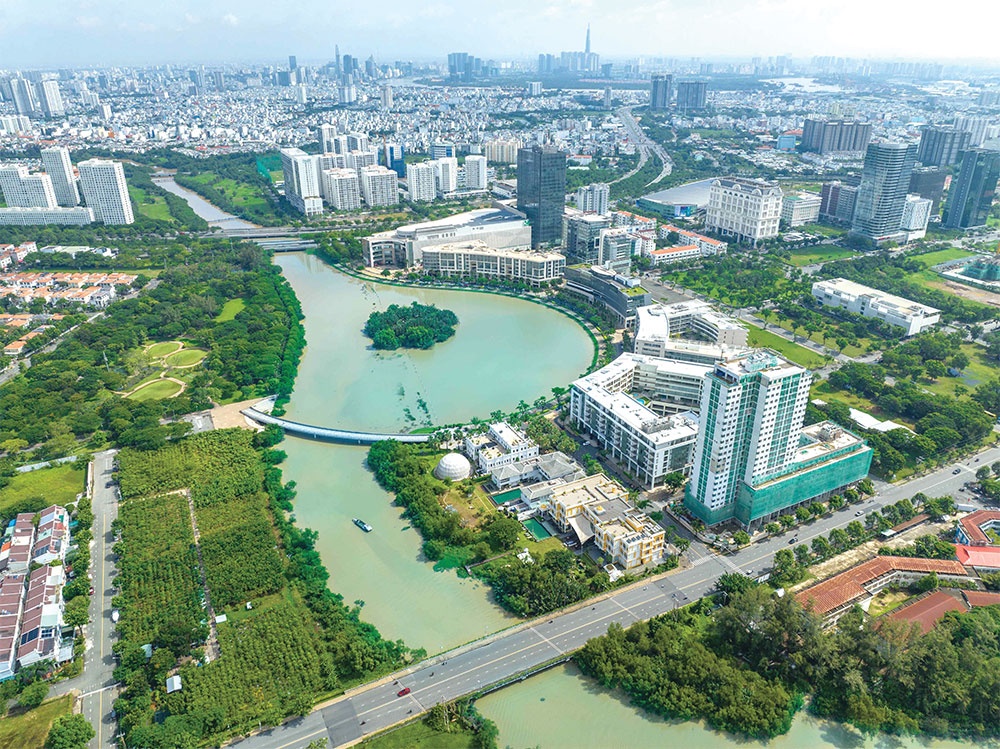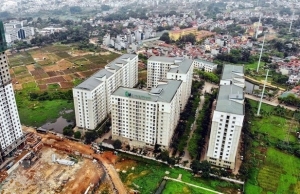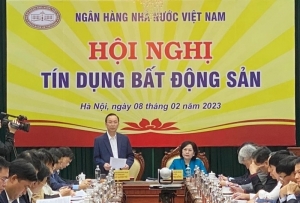Real estate funding on right track via overseas sources
 |
| Real estate funding on right track via overseas sources, Photo Le Toan |
While the global economy is on the mend and demand is recovering, hiked interest rates and inflation along with geopolitical tensions, among other things, continue to threaten.
Locally, economic and adaptation measures, irregularities in the bond market, and a property credit crunch were notable events stemming from last year.
According to Marc Townsend, chairman of Arcadia Consulting Vietnam, 2023 looks set to be another year of the world living dangerously. But on the other hand, the impending return of confidence promises a silver lining.
“With better clarity on Vietnam’s policies and an improving economic outlook, investor sentiment is expected to recover. Opportunities remain for them to tap alternative asset classes such as self-storage spaces, workers accommodation, data centres, cloud kitchens, and retirement living,” Townsend said.
“A creative blend of core and alternative assets and relentless yields engineering will add resilience to portfolios amid the ongoing volatilities. But first, we must brace for more pressures,” he added.
Although high inflation accompanied by signs of economic recession in the US and Europe has been covering the picture of the global real estate market with gloomy colours, brighter spots can still be found in some markets in Asia-Pacific.
According to Savills, the three countries with the most prominent prospects in the region today are Vietnam, Singapore, and Japan. In addition, China, Vietnam, Indonesia, and India are forecast to lead global GDP growth in 2023.
It is also expected that activity in the construction market of Vietnam will increase from $41 billion in 2022 to $46 billion in 2023.
Inflow of capital
The improvement in the business environment and incentives from the government are boosting the interest of foreign businesses in the Vietnamese real estate market. While some domestic investors faced difficulties due to tightened credit, foreign inflows into the market continued to grow.
For example, recently, Singapore’s CapitaLand announced a plan to develop a complex that is expected to provide more than 1,100 luxury apartments and shophouses in Ho Chi Minh City.
As for industrial real estate, manufacturing enterprises are actively investing in this field and logistics, aiming to diversify activities in their China+1 strategy. These include German group Tesa, ESR Cayman Ltd., BW Industrial Development, and others.
A report released December 2022 by the Housing and Real Estate Market Management Agency under the Ministry of Construction showed that industrial real estate was recognised as a bright spot of the entire market in 2022.
The average occupancy rate of industrial parks in the southern provinces is the highest in the country, reaching about 85 per cent. Some industrial zones in the major cities are almost completely filled. Meanwhile, Binh Duong is the locality with the highest occupancy rate in the country, with 29 industrial parks already in operation with an occupancy rate of over 95 per cent.
Vietnam has also been a key beneficiary of the reallocation of manufacturing and supply chain activities to Southeast Asia. This transformative shift has been further accelerated by the supply chain disruptions that have resulted on account of COVID-19. Vietnam’s best-in-class response to the pandemic and successful public health outcome has ensured that the country continues to benefit from increasing manufacturer interest from across regions.
Meanwhile, with the housing market in South Korea entering a period of stagnation, the business expansion strategy of Korean construction enterprises is also changing. Large companies such as GS, Daewoo, and Lotte have chosen Vietnam as priority to explore foreign markets in 2023.
Lotte E&C is strengthening its local presence by undertaking large-scale development projects in Ho Chi Minh City and Hanoi, and is recently considering to southern Binh Duong province.
The Lotte Eco Smart City Thu Thiem project broke ground in September and will cover 50,000 sq.m in Ho Chi Minh City. The project will feature 11 buildings of 10-50 floors and feature hotels, homes, and apartments.
Also joining the market in Ho Chi Minh City is GS E&C. The company is currently building Korean-style smart urban area GS Metro City Nha Be in the city’s Nha Be district.
Along with those individual ventures, and with the active support policy of the South Korean government for domestic companies to penetrate foreign markets, overseas orders of Korean construction enterprises are expected to be more active.
More to come
David Jackson, CEO of Colliers Vietnam, stressed that entering the year of 2023, the sentiment among real estate investors is much like cautious anticipation of steady growth and healthier returns in the longer term starting the latter part of 2023.
He added that though some recent changes may prompt investors to be more caution, Vietnam still projects a consistent reputation as a safe place to park money amid global turmoil.
“The country has achieved stellar growth over the years, in fact, one of the world’s fastest-growing economies, with long-term positive returns on real estate investment in almost all segments,” he said.
With investors shifting to a more defensive investment strategy, office, industrial and logistics real estate are most in demand in 2023. The Vietnamese government has been investing heavily in national infrastructure development to boost the industrial manufacturing sector and lowering barriers for foreign investors. Jackson explained that foreign investors who want to enter Vietnam market and set up their operations need offices, factories, and warehouses.
“The next types of assets to be on investors’ radar would be in the housing and serviced apartment segments, especially those serving the real needs of workers, experts and expats migrating to Vietnam and industrial clusters in the country. Other interesting segments worth watching in 2023 are retail and hospitality real estate, as Vietnam’s domestic consumption has potential,” he added.
The most recent notable deals of foreign investors that took place at the end of 2022 include Malaysian property developer Gamuda Land has acquired a local company to develop a high-rise apartment building in Thu Duc of Ho Chi Minh City. The site, covering approximately three hectares, will consist of 1,300 apartment units. The total gross development value of the project is estimated to be over $250 million.
Last September, Becamex TDC announced a plan to transfer the entire project of Ngan Ha Street Commercial Housing Area in Binh Duong to Gamuda Land Binh Duong Co., Ltd., with the total transfer value sitting at nearly VND1.28 trillion ($54.6 million).
Elsewhere, in addition to attracting foreign inflows from industrial park infrastructure tenants such as Samsung, Foxconn, and LG, Sri Avantika Contractor Ltd. from India has also chosen to invest in the International Pharmaceutical Park project in Hai Duong province. The venture has a scale of 960 ha and a projected value of $10-12 billion.
For the retail and rental real estate segment, Becamex Tokyu (a joint venture between Becamex IDC and a Japanese enterprise) topped off the SORA Gardens SC Shopping Centre in Binh Duong New City in December.
Thai group Central Retail also plans to pour around $840 million into Vietnam before 2026 to expand into commercial centres and the non-food sector.
| Overseas investment in real estate 2022 In 2022, the real estate market received foreign direct capital 1.7 times higher than the previous year, reaching $4.45 billion. Of which, newly registered capital hit nearly $1.82 billion with 75 new projects. For the whole year up to December 20, newly registered, adjusted capital, and purchased shares through foreign investors in Vietnam reached $27.7 billion, equalling 89 per cent compared to the same period last year. Among 19 industries attracting foreign investment inflows, real estate ranked second at more than $4.45 billion, accounting for 16 per cent of the total. Accumulated to December 20, 1,072 foreign-invested projects in the real estate sector are currently active, with total registered capital of those projects reaching nearly $66.3 billion. Source: Foreign Investment Agency under the Ministry of Planning and Investment |
| Michael Kokalari, Chief economist VinaCapital
Foreign direct investment (FDI) inflows grew 14 per cent last year and are likely to grow by a similar magnitude this year as more and more factories to relocate from China or to set up in Vietnam instead of in China. Those inflows also directly benefit industrial park developers, ports, and real estate developers that have projects in proximity to foreign-invested factories. Continued overseas funding inflows Vietnam’s main appeal as a destination for FDI stems from the fact that factory wages are about one-third of those in China, and the quality of the workforce is comparable to that of China, according to surveys by the Japan External Trade Organization and others. Vietnam’s close geographic proximity to Asia’s supply chains, especially in the high-tech industry, is another factor. In recent years, an increasing number of multinational firms started diversifying their manufacturing outside of China for a variety of reasons, including China’s pandemic strategy and the US-China trade war. In 2022, the Biden administration dramatically escalated the US-China trade war by signalling its intention to keep former Chinese tariffs in place indefinitely, evidenced by US Trade Representative Katherine Tai’s assertion that the tariffs would stay in place “until the day that China chooses a path to have its economy operate more like ours”. That escalation of trade tensions, coupled with China’s pandemic strategy, helps explain why Samsung announced that it will start producing semiconductor parts in the country and Apple announced that it will begin producing Apple Watches and MacBooks in Vietnam, which will be the first time these products will be made outside of China. Apple has big plans for Vietnam according to insiders, who also noted that the Apple Watch is particularly complicated to manufacture because of the challenge of squeezing so many components into such a small case. The net result of all of the above is that FDI inflows increased by another 14 per cent in 2022 to $22 billion (or 6 per cent of GDP) and we expect a similar magnitude of inflows this year. | |
| Neil MacGregor, Managing director Savills Vietnam
The fundamentals of the Vietnamese property market remain very strong for international property investors, with strong GDP growth, a compelling urbanisation and infrastructure story, a growing workforce and a rapidly growing middle class, which all lead to strong consumer spending growth. At the same time, the government’s efforts to create a more transparent and open real estate sector, through the anti-corruption drive, and improvements to the legal framework, are seen as creating a more favorable investment environment, encouraging a more sustainable real estate sector. The current credit crunch has resulted in more local developers seeking foreign capital partners, who now have opportunities that they have not previously been able to access. Foreign real estate investors are typically taking long-term views on Vietnam’s growth and are bringing many years of experience from other similar growth markets across Asia. Some of these investors have been trying to invest in Vietnam for many years, and welcome the opportunity to secure strong partnerships with local developers for long-term and sustainable development. In particular, Japanese investors have a long-term view and they are excited to be able to access better opportunities today and invest with Vietnamese partners for the long term. We can also see strong appetite from South Korean investors and renewed interest from Taiwan. This movement of capital from these markets to Vietnam could become a more sustained trend, with strong ties between them and Vietnam already well established. More generally, there will be an increase in interest from private equity, who are able to structure deals to target high-growth opportunities and assess future exit opportunities as the Vietnam market continues to mature. Meanwhile, other international investors are continuing to seek exposure to the Vietnam market through regional real estate funds based in Hong Kong or Singapore, and they are increasingly focused on Southeast Asia. |
 | Central bank not tighten real estate credit: Deputy Governor The State Bank of Vietnam (SBV) has never issued any documents or statements ordering credit for real estate be tightened, Deputy Governor Dao Minh Tu said on February 8. |
 | Vietnam may become largest retail real estate market in region Hoang Nguyet Minh, senior director of Commercial Leasing at Savills Hanoi, discussed the short-term prospects of real estate investment at a VIR roundtable on February 7. |
 | SBV will continue providing capital for real estate sector Deputy Governor of the State Bank of Vietnam Dao Minh Tu has clarified that the bank has not restricted real estate loans, contrary to reports. |
What the stars mean:
★ Poor ★ ★ Promising ★★★ Good ★★★★ Very good ★★★★★ Exceptional
Related Contents
Latest News
More News
- Construction firms poised for growth on public investment and capital market support (February 11, 2026 | 11:38)
- Mitsubishi acquires Thuan An 1 residential development from PDR (February 09, 2026 | 08:00)
- Frasers Property and GELEX Infrastructure propose new joint venture (February 07, 2026 | 15:00)
- Sun Group led consortium selected as investor for new urban area (February 06, 2026 | 15:20)
- Vietnam breaks into Top 10 countries and regions for LEED outside the US (February 05, 2026 | 17:56)
- Fairmont opens first Vietnam property in Hanoi (February 04, 2026 | 16:09)
- Real estate investment trusts pivotal for long-term success (February 02, 2026 | 11:09)
- Dong Nai experiences shifting expectations and new industrial cycle (January 28, 2026 | 09:00)
- An Phat 5 Industrial Park targets ESG-driven investors in Hai Phong (January 26, 2026 | 08:30)
- Decree opens incentives for green urban development (January 24, 2026 | 11:18)



 Tag:
Tag:




















 Mobile Version
Mobile Version